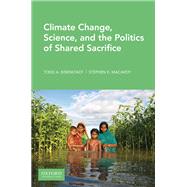Designed for undergraduate courses that cover climate change politics within environmental studies, politics, and international relations courses, Climate Change, Science, and The Politics of Shared Sacrifice integrates science and policy within each chapter by considering technical issues as well as their political implications. It reflects the recent changes in US climate policy under President Biden, as well as by other international actors, and covers recent technological advances, including carbon capture, storage and solar energy efficiency. This text presents the questions students need to address in an interdisciplinary approach to perhaps the most encompassing and "wicked" threat to our well-being in the 21st Century. It addresses the impacts of climate change, the history of international negotiations leading to the Paris Agreement and its possible "ambition gap," approaches to decarbonization by nations and economic sectors, and efforts to construct post-fossil fuel energy systems. It also considers implications of recent technological advancements in energy and its distribution, the debate about the "social cost of carbon," the economic costs of adapting to climate change, and the proper roles of individuals versus governments, corporations, and environmental groups.
Over a dozen applied exercises and case studies at the conclusion of each chapter further illustrate the timeliness of the subject matter and give students "hands on" experience with role-playing exercises as United Nations negotiators, or Peruvian peasants suing a German utility company, to give a few examples. The text addresses the "collective action problem" early in the text, discussing the strength of the scientific evidence, the failure to come to terms with related social and political problems, and the scope of the problem and why so little has been done. At a theoretical level, the text addresses the discord between theories of collective action and interest groups for explaining inaction on climate policy. The text also considers the increasingly prevalent view of climate change as a security threat affecting some groups and countries more than others; it considers the need of some countries to adapt as well as addressing the more traditional approach of mitigating climate change. The second part of the book discusses that while there is no single magical solution, there are many partial solutions which could contain global climate change within prescribed limits. We also discuss forms of solving the political, social, and economic problems stemming from climate change, but note that different solutions produce different "winners" and "losers." Changes to how we produce and consume energy will be driven by market forces, thoughtful policy, and by steady efforts to inform the public.
The instructor resources site includes access to chapter graphics, class PowerPoints, and case study sample solutions.








